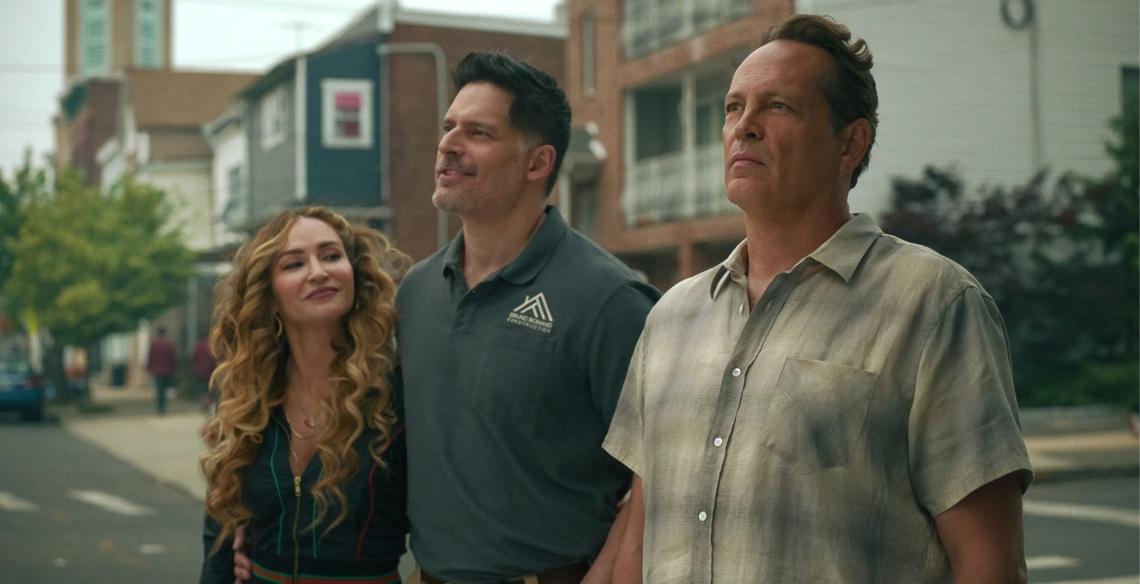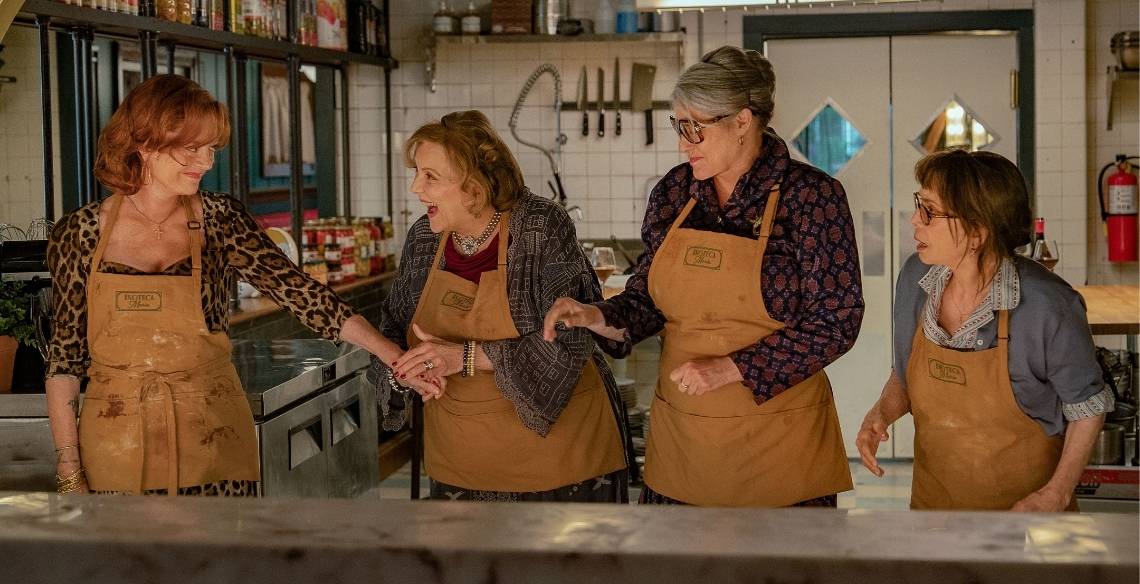My abuela died in 2007, and in the 18 years since she’s been gone, cooking has been a connection to her. It took me a solid ten years to replicate her recipe for beans. A humble side, good beans can uplift any Mexican breakfast, lunch, or dinner. As a picky eater, those beans were pretty much all I ate for years. And now, I feed my grief by making them for others. The Netflix Original Film Nonnas deeply understands the personal connection we have to those we love through our food.
Directed by Stephen Chbosky and written by Liz Maccie, Nonnas is inspired by Jody Scaravella‘s life story. In the film, Joe (Vince Vaughn) loses his mother. Upon her death, she left him with 200,000 dollars, the house, and the empty space where she used to be. Joe took care of his mother and his Nonna (Italian for grandmother) in his adult life.
Now, he doesn’t know what to do. During his mother’s wake, a friend brings over a dish and tells him to “feed your grief.” To be honest, I didn’t understand that line when it was said, but as Nonnas continued, I realized what the story was tapping into. And with that, I found a new way to describe what I’ve done to process my own grief and also to keep my abuela alive.
To remain connected to his mother, Joe starts cooking her food. Her pasta and her soups, and he tries incredibly hard to nail down his mom’s gravy. After his friends push him to do something with his inheritance money, he decides to open a restaurant. The restaurant concept leans on the one wish of people who have lost members of their family who cook to eat their food one more time. Instead of chefs, it’s nonnas doing the cooking and setting the menu.
Vince Vaughn is at his absolute best in Netflix’s Nonnas.

At just under two hours long, Nonnas never feels its length. Joe’s endeavor comes directly from his heart. Working as an auto mechanic during the day, Joe ropes his best friend Bruno (Joe Manganiello) to be his contractor and Bruno’s wife Stella (Drea de Matteo) to do the design to make it all happen. The reason it’s hard is that the restaurant location is in Staten Island, and he works in the Bronx. By leaning on his friends at work, Joe tries his hardest to make it work, and he does, thanks in large part to the nonnas in the kitchen.
One of the most essential elements of Nonnas is the idea that our cooking carries our family’s stories. One dish holds generations. By eating and cooking it, you keep the story going. The film doesn’t just imply this; it’s spelled out. Ultimately, it’s why each of Joe’s chefs chooses to come to the restaurant.
First, he asks his mother’s best friend, Roberta (Lorraine Bracco). Then, he asks his old childhood friend Olivia’s (Linda Cardellini) neighbor and surrogate nonna, Antonella (Brenda Vaccaro). Finally, a retired nun, Teresa (Talia Shire), joins the team. Roberta is from Sicily, Antonella is from Bologna, and Teresa is from Brooklyn. To round out the restaurant, Joe reaches out to the neighborhood hairdresser, Gia (Susan Sarandon), to come and bake her family’s famous desserts.
Joe’s path with the restaurant is to honor his mother. It’s to feel closer to her and his nonna. Throughout the film, we see flashbacks of him sitting at a counter in a kitchen, tasting their food, and shopping in a farmer’s market. Joe’s memories of them are tied to the love they poured into feeding the family. But to feed his grief, he also looks to feed others. It’s a beautiful story that ultimately may feel a little too dramatic at points, but the heart is there.
The good choice that Nonnas makes is to allow Joe to find a connection with Olivia. Romance grows throughout the film, but it’s secondary to how much Olivia and Joe respect each other and their quest to make the restaurant successful. While some moments push the potential relationship, Nonnas manages not to overload them with too much romance and instead refocuses on how the two help each other with their respective loss.
The nonnas are the heart and soul of this Netflix Original Film.

As much as Nonnas is about Joe’s movement through his grief, the film isn’t just about him. Each of the nonnas who have come to the restaurant has their own stories. It’s easy to say that these women bring generations of stories with their cooking, but it’s another to take the time to ensure the audience knows who they are.
Roberta is a loving mother but doesn’t keep in touch with her kids. Too spiteful to admit when she’s wrong, her relationship with them has become strained. Antonella is still grieving her husband years after he passed. With his picture guiding her through her choices, she’s come to love Olivia as a daughter. The love-hate dynamic between Roberta and Antonella about which hometown is better is endearing, hilarious, and feels all too real. Then there are the two women who aren’t nonnas, but their stories speak loudly just the same.
Teresa is a retired nun looking for a calling to fill the void of leaving her vows. As we see her with the other women, she’s the calm force in the kitchen. A peacemaker, her time cooking at the convent informs her menu. And as we learn through her story, her retirement wasn’t necessarily on good terms. She loved a woman, and for that she had to leave the Church.
Nonnas captures the stories we keep, the ones we tell, and how we pass them all down through food.

And finally, Susan Sarandon‘s Gia is a single woman who has never looked to find a man or build a family. She started cleaning up clippings from a beauty salon, learned to cut hair in one chair, and eventually cut hair in all of them, and now, she owns the place. She sticks out from the other nonnas with revealing clothes and a lot of make-up. As the women comment on her appearance, Gia shares that she is a breast cancer survivor, and looking good is for her, not any man around.
The women in Nonnas are vital to the film’s success. This is a story about grief, yes. But it’s also a story that reminds the audience to call their mothers, listen to the stories the elders in their communities have to say and cherish the memories shared around a dinner table.
Food is a great unifier. It’s our cultures and histories, and a simple sauce recipe holds a mountain of traditions. We hold onto the food memories we create; they are moments where we can feel the love. Nonnas is a grief story for all of us who open up the fridge and start making something the moment we miss a loved one. As far as “based on a true story” films go, Nonnas is a great one. While paint-by-numbers storytelling is expected, the film’s heart creates an intimate experience for the audience. The grief feels real, and so does the remedy for it.
Nonnas is streaming now, exclusively on Netflix.
Nonnas (2025)
-
Rating - 8/108/10
TL;DR
As far as “based on a true story” films go, Nonnas is a great one. While paint-by-numbers storytelling is expected, the film’s heart creates an intimate experience for the audience. The grief feels real, and so does the remedy for it.







